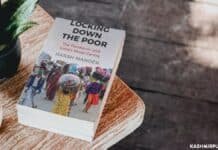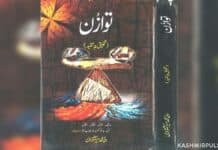
The canvas of poetry relates to whatever gives immediate pleasure or pain to the human mind, writes William Hazlitt. This pain or pleasure can either be of collective nature or an individual experience.
An entity taken as independent in the world of emotions and feelings loses its essence. In order to keep it intact, it is obligatory to focus on the aspects that may seem concealed.
Enthusiastic and energetic young power packed Varsha Singh in Parbati – The Traitor and Other Poems characterizes the pain and agony of essentially feminine. The pain that never leaves her alone in the vast ocean of agony and despair. It hardly matters in what position she is serving the society: as a daughter, as a sister, as a wife or as a mother. She is always supposed to be a master in concealing the bruised and over bruised layouts of her inner being behind a facade of fake smiles, compromises and willful deceits. She writes:
while the night
suffers insomnia
my country bleeds (Insomniac)
with broken limbs
fractured spine
my poem walked
through distorted lines
camouflaged as
old man’s sculpture (Poem in Distortion)
They live the life
of their bodies,
blithe fleshy parts
leaving their soul (Life A flesh)
Today feminism is more or less a worldwide phenomenon. The demand of equal rights and eve emancipation is its main focus across the length and breadth of the globe but in some places like India, it is a different discourse – a struggle to stand and prove one’s existence among the storm of outdated traditions and meaningless customs.
In Parbati – The Traitor, Varsha Singh has tried her best to highlight the rotten and putrid behind the gloss and glitter that is put on display in the exhibition otherwise thought to soothe the visitors. Each poem carries the state of the pitiable and pathetic condition of women in Indian society. So it can be said that the free expression in all walks of life against the traditional barriers constitutes the crux of feminism in Indian literature.
They caged her brain
in a pot earthen
below their beds
only to rot (Parbati – The Traitor – I)
they did rafoo*
the tattered sheet of cloth
but could not, the tattered soul (Rafoo)
* rafoo is a word which is used for ‘mending’ in Hindi
What women feel about the unseen cage she is living in from ages and what remedy there is to come out of that unseen cage is beautifully portrayed by Audre Lorde in her famous essay, Poetry Is Not A Luxury (1985). She writes, “Sometimes we drug ourselves with dreams of new ideas. The head will save us. The brain alone will set us free. But there are no new ideas still waiting in the wings to save us as women, as human. There are only old and forgotten ones, new combinations, extrapolations and recognitions from within ourselves, along with the renewed courage to try them out. And, we must constantly encourage ourselves and each other to attempt the heretical actions our dreams imply and some of our old ideas disparage. In the forefront of our move towards change, there is only our poetry to hint at possibility made real. Our poems formulate the implications of ourselves, what we feel within and dare make real (or bring action into accordance with), our fears, our hopes, our most cherished terrors.” It seems as if Varsha Singh has taken the words of Audre Lorde as the raison d’être of her poetry. She believes in poetry as vital necessity of existence rather than a mere luxury. She says:
They live at
melting points of orb
where everything thaws
but their frozen hearts! (The Cold Country)
or
Self-love, for you
is an act, whoresome,
a blasphemy
towards your ‘owner’,
you harlot! (Self Love)
The last poem of Varsha Singh’s feministic poetry collection is “Poetry” that expresses itself as the level of engagement of poet with poetic world.
I <s-t-r-e-t-c-h> the syllables
like ~~s~~t~~r~~i~~n~~g~~
but they deny
being <s-t-r-e-t-c-h-e-d>
I t|e|a|r the rhymes
like p/a/p/e/r
but they deny
being t|o|r|n
In return
they
t|e|a|r
they
<s-t-r-e-t-c-h>
then ****ROPE**** me
within their realm (Poetry)
BOOK: Parbati – The Traitor
GENRE: Poetry
AUTHOR: Varsha Singh
PUBLISHER: Authors Press
YEAR OF PUBLICATION: 2017
ISBN: 978-93-5207-542-3
PAGES: 83
PRICE: ₹250 / $12
Follow Us
The Kashmir Pulse is now on Google News. Subscribe our Telegram channel and Follow our WhatsApp channel for timely news updates!




![Dark Endeavour [Book Review] Dark Endeavour [Book Review]](https://kashmirpulse.com/wp-content/uploads/2022/06/Dark-Endeavour-Book-Review-218x150.jpg)





